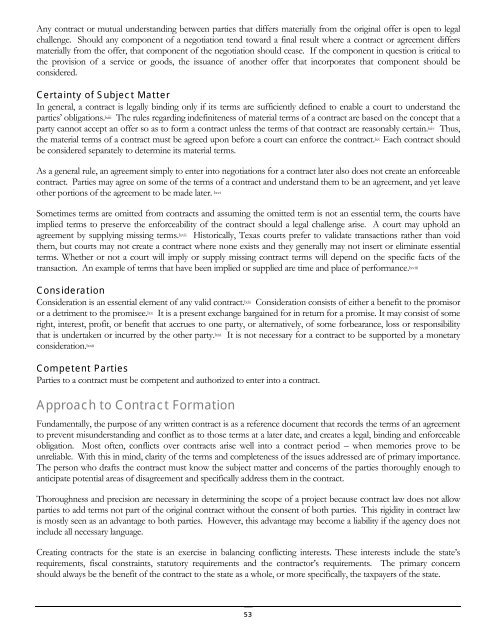Contracts Management Guide - Texas Comptroller of Public Accounts
Contracts Management Guide - Texas Comptroller of Public Accounts
Contracts Management Guide - Texas Comptroller of Public Accounts
Create successful ePaper yourself
Turn your PDF publications into a flip-book with our unique Google optimized e-Paper software.
Any contract or mutual understanding between parties that differs materially from the original <strong>of</strong>fer is open to legal<br />
challenge. Should any component <strong>of</strong> a negotiation tend toward a final result where a contract or agreement differs<br />
materially from the <strong>of</strong>fer, that component <strong>of</strong> the negotiation should cease. If the component in question is critical to<br />
the provision <strong>of</strong> a service or goods, the issuance <strong>of</strong> another <strong>of</strong>fer that incorporates that component should be<br />
considered.<br />
Certainty <strong>of</strong> Subject Matter<br />
In general, a contract is legally binding only if its terms are sufficiently defined to enable a court to understand the<br />
parties’ obligations. lxiii The rules regarding indefiniteness <strong>of</strong> material terms <strong>of</strong> a contract are based on the concept that a<br />
party cannot accept an <strong>of</strong>fer so as to form a contract unless the terms <strong>of</strong> that contract are reasonably certain. lxiv Thus,<br />
the material terms <strong>of</strong> a contract must be agreed upon before a court can enforce the contract. lxv Each contract should<br />
be considered separately to determine its material terms.<br />
As a general rule, an agreement simply to enter into negotiations for a contract later also does not create an enforceable<br />
contract. Parties may agree on some <strong>of</strong> the terms <strong>of</strong> a contract and understand them to be an agreement, and yet leave<br />
other portions <strong>of</strong> the agreement to be made later. lxvi<br />
Sometimes terms are omitted from contracts and assuming the omitted term is not an essential term, the courts have<br />
implied terms to preserve the enforceability <strong>of</strong> the contract should a legal challenge arise. A court may uphold an<br />
agreement by supplying missing terms. lxvii Historically, <strong>Texas</strong> courts prefer to validate transactions rather than void<br />
them, but courts may not create a contract where none exists and they generally may not insert or eliminate essential<br />
terms. Whether or not a court will imply or supply missing contract terms will depend on the specific facts <strong>of</strong> the<br />
transaction. An example <strong>of</strong> terms that have been implied or supplied are time and place <strong>of</strong> performance. lxviii<br />
Consideration<br />
Consideration is an essential element <strong>of</strong> any valid contract. lxix Consideration consists <strong>of</strong> either a benefit to the promisor<br />
or a detriment to the promisee. lxx It is a present exchange bargained for in return for a promise. It may consist <strong>of</strong> some<br />
right, interest, pr<strong>of</strong>it, or benefit that accrues to one party, or alternatively, <strong>of</strong> some forbearance, loss or responsibility<br />
that is undertaken or incurred by the other party. lxxi It is not necessary for a contract to be supported by a monetary<br />
consideration. lxxii<br />
Competent Parties<br />
Parties to a contract must be competent and authorized to enter into a contract.<br />
Approach to Contract Formation<br />
Fundamentally, the purpose <strong>of</strong> any written contract is as a reference document that records the terms <strong>of</strong> an agreement<br />
to prevent misunderstanding and conflict as to those terms at a later date, and creates a legal, binding and enforceable<br />
obligation. Most <strong>of</strong>ten, conflicts over contracts arise well into a contract period – when memories prove to be<br />
unreliable. With this in mind, clarity <strong>of</strong> the terms and completeness <strong>of</strong> the issues addressed are <strong>of</strong> primary importance.<br />
The person who drafts the contract must know the subject matter and concerns <strong>of</strong> the parties thoroughly enough to<br />
anticipate potential areas <strong>of</strong> disagreement and specifically address them in the contract.<br />
Thoroughness and precision are necessary in determining the scope <strong>of</strong> a project because contract law does not allow<br />
parties to add terms not part <strong>of</strong> the original contract without the consent <strong>of</strong> both parties. This rigidity in contract law<br />
is mostly seen as an advantage to both parties. However, this advantage may become a liability if the agency does not<br />
include all necessary language.<br />
Creating contracts for the state is an exercise in balancing conflicting interests. These interests include the state’s<br />
requirements, fiscal constraints, statutory requirements and the contractor’s requirements. The primary concern<br />
should always be the benefit <strong>of</strong> the contract to the state as a whole, or more specifically, the taxpayers <strong>of</strong> the state.<br />
53

















